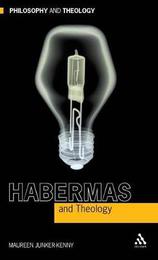
|
Habermas and Theology
Hardback
Main Details
| Title |
Habermas and Theology
|
| Authors and Contributors |
By (author) Professor Maureen Junker-Kenny
|
| Series | Philosophy and Theology |
|---|
| Physical Properties |
| Format:Hardback | | Pages:224 | | Dimensions(mm): Height 216,Width 138 |
|
| Category/Genre | Philosophy of religion
Theology |
|---|
| ISBN/Barcode |
9780567033222
|
| Classifications | Dewey:210 |
|---|
| Audience | | Professional & Vocational | |
|---|
|
Publishing Details |
| Publisher |
Bloomsbury Publishing PLC
|
| Imprint |
T.& T.Clark Ltd
|
| Publication Date |
24 February 2011 |
| Publication Country |
United Kingdom
|
Description
This is an exploration of the religious aspects of Habermas' philosophy and the response from theology. With his theory of communicative rationality, Jurgen Habermas has been one of the most influential social philosophers of the 20th century and a major dialogue partner for theology in the different stages of his work. Systematic Theology and ecclesiology, Practical and Moral Theology as well as Religious Education have offered creative receptions and astute critiques. The book explores the origins of Habermas' thinking from the Critical Theory of the first generation of the Frankfurt School to his turn from the philosophy of consciousness to language, and to the development of his theories of the public sphere, of law, and democracy. The philosophical critiques of his work that are relevant for theology are explained before the successive phases of his view of religion are traced: supercessionism, coexistence, and finally co-operation in offering specific resources and shared criteria for public debate on the future directions of a technologically shaped pluralist culture. "The Philosophy and Theology Series" looks at major philosophers and explores their relevance to theological thought as well as the response of theology.
Author Biography
Maureen Junker-Kenny is Associate Professor of Theology at Trinity College Dublin, Ireland.
ReviewsIn this knowledgeable work, Junker-Kenny examines the turn to religion in Habermas' latest work calling for a process of mutual translation of religion and postsecular reason. She traces this back to his early engagement with religion and the later chastening of religion in discourse ethics. She lucidly presents the major philosophical objections to the founding concepts of Habermas' reasoning, welcoming the called-for alliance of theology and postsecular reason against the 'pathologies of modernity'. The book is a thorough systematic reconstruction and a groundbreaking source for the dialogue between theology and philosophy. -- Hille Haker, Loyola University Chicago, USA. Ever since the pioneering Chicago symposium and 1992 collection of essays on Habermas and theology by Browning and Schussler Fiorenza, we have been waiting for a major interpretative work that bridges German and English language scholarship and debates on this leading European public intellectual. The time of waiting is now over. Maureen Junker-Kenny has written a finely grained interdisciplinary study of the highest order, expounding Habermas' thought with mastery and clarity and bringing it into fruitful conversation with her constructive theological concerns and criticisms. It could not be more timely. Here is the book to give the new global movement in public theology theoretical depth and conceptual rigour. I commend it to scholars and students alike in theology, philosophy, politics, and social theory, and to all who are concerned about the theological contribution in the Habermasian public sphere. -- William Storrar, Center of Theological Inquiry, Princeton, USA.
|